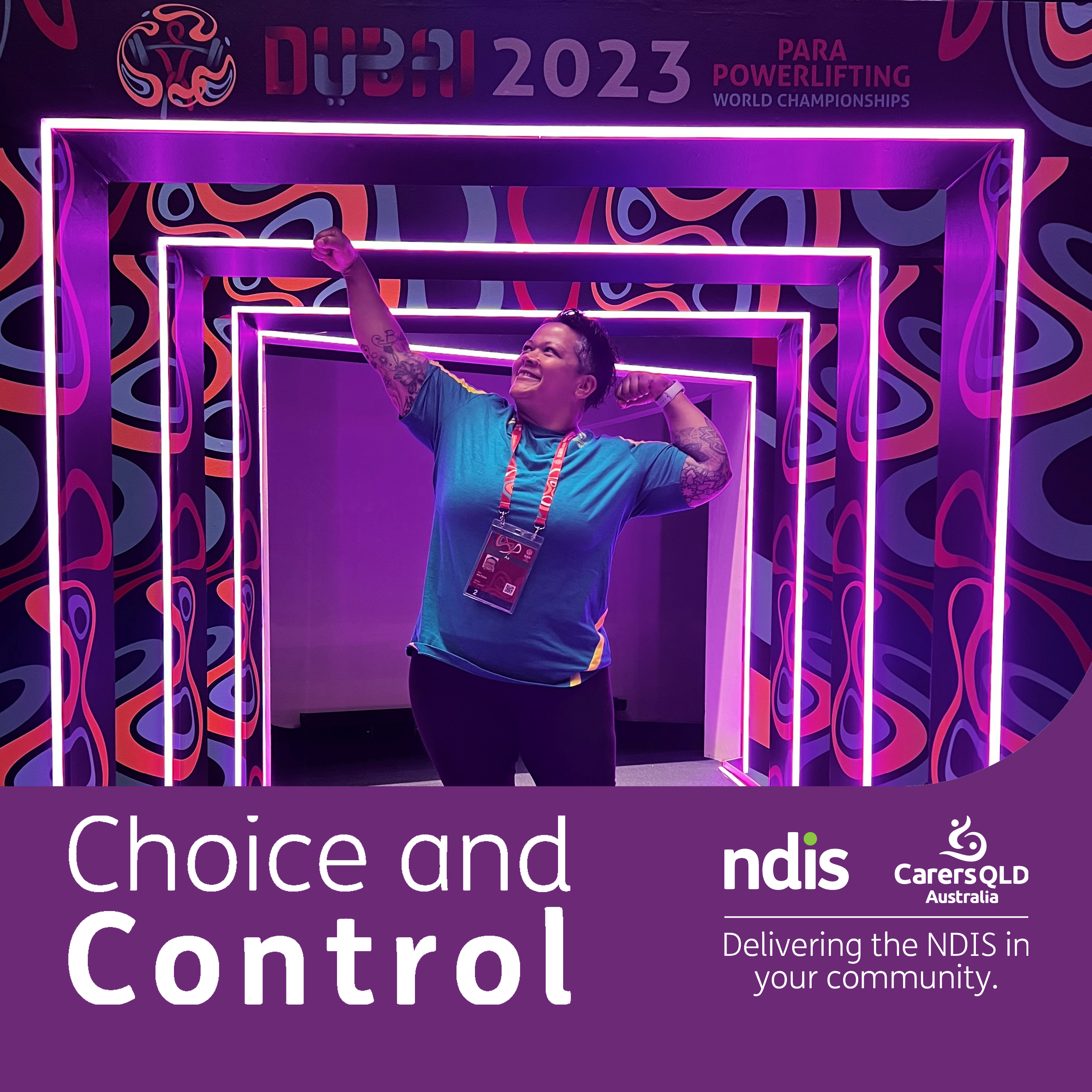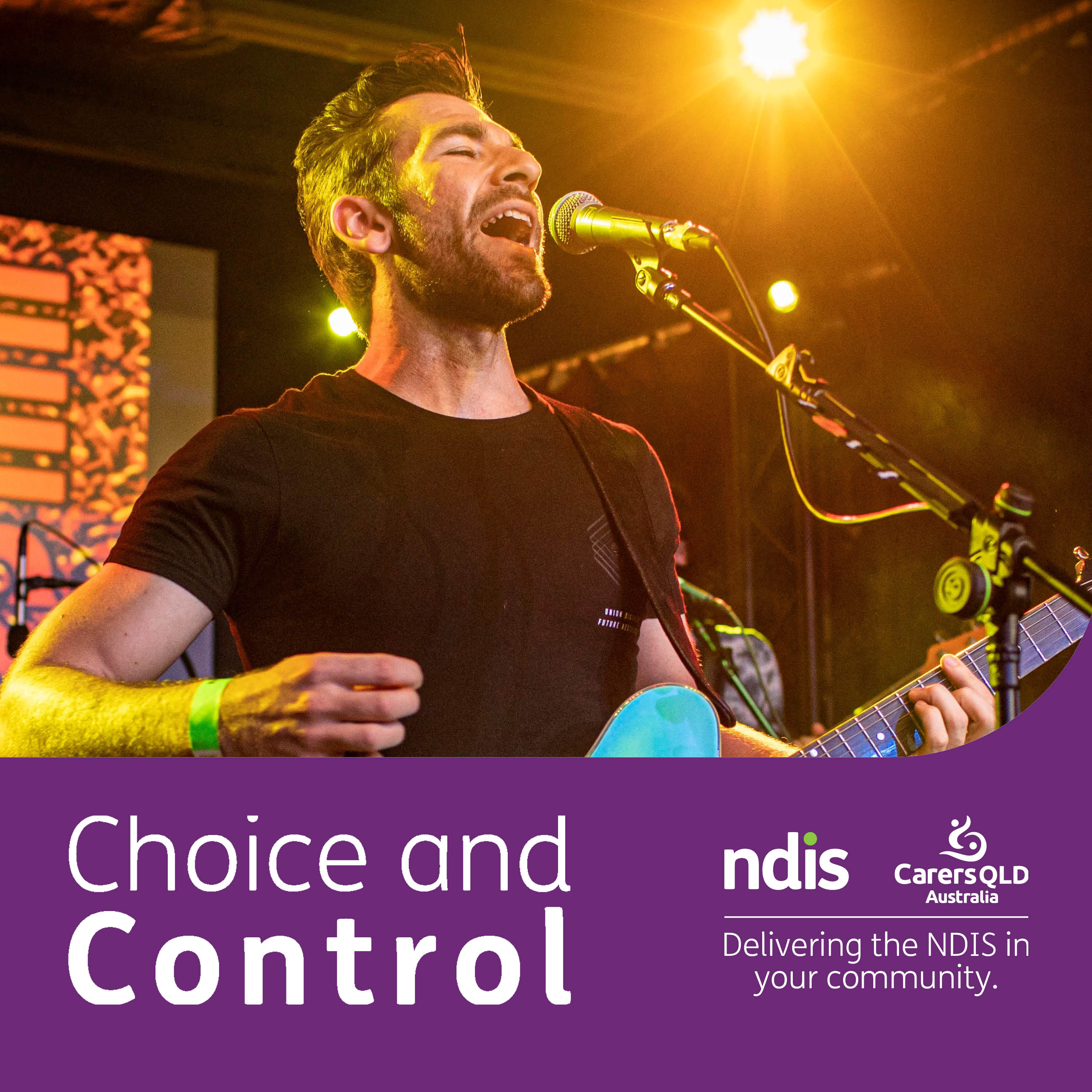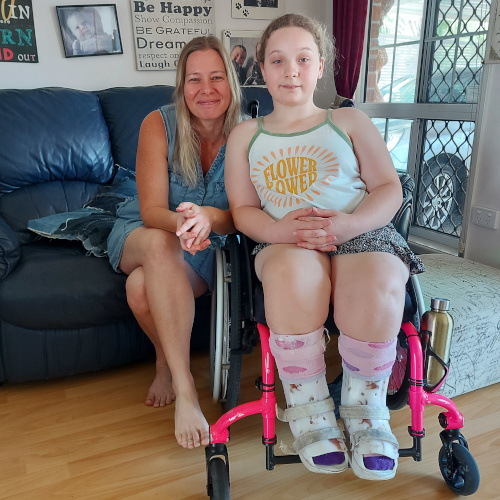Speaker 0 00:00:00 LAC Connect. It's a new way to stay in touch with your local area coordinator, Carers Queensland, with everything you need right here on your device. It's a handy app to keep track of your LAC appointments, browse workshops and events, check out information and support and get the latest news stories and podcasts. It's available on Android and iOS, so whatever device you have, you can stay in touch. Head to our website to sign
[email protected] au and look for Connect
Speaker 0 00:00:38 Choice and Control a podcast celebrating people with disability. Brought to you by Carers Queensland, NDIS, Local Area Coordination partner in the community. Sport is for everybody of all abilities. That's why Carers Queensland has a project called Inclusive Sport and Recreation Communities. It's all about building better access to opportunities to get active and increasing the representation of people with disability in sport of all kinds and at all levels. There are so many passionate people with disability working in this space already and they have a wealth of knowledge and experience to share. We're tapping into what they know with the Beyond the Sidelines reference group. It's a team of people from right across Queensland, all with lived experience. They're helping us identify what's already working, make plans for improvement and prioritize our efforts. Special Olympian Ruby Lawler is representing Central Queensland in the group.
Speaker 2 00:01:39 Inclusion's important for me because if we didn't have it, there wouldn't be anything for people like us to do. I believe the people like us should have the opportunity as well.
Speaker 0 00:01:55 Ruby's getting ready to head to Berlin for the Special Olympics world competition in June. She's not competing this time. She's going as an athlete leader.
Speaker 2 00:02:04 I'm on the um, board of directors for Special Olympics Australia. The opportunities sort of came about being on the board and having done athlete leadership stuff locally before they sort of just found me. There was an interview process that I had to go through. It was a little bit scary but it was okay.
Speaker 3 00:02:33 So you must really like to do lots of things and change the world or most You want to change the world so it's more inclusive from the sounds of
Speaker 2 00:02:40 It. I do, yes.
Speaker 3 00:02:42 And why is that, do you think, Ruby? What makes you really want to do that?
Speaker 2 00:02:47 Because we deserve better. We deserve to be included. We deserve to be able to do anything we want to do or anything we want to achieve.
Speaker 3 00:03:00 So when you heard about um, Kira's Queensland's Sport and Recreation program and there was an opportunity to join the Beyond the Sidelines reference group,
Speaker 2 00:03:10 I jumped at the opportunity cuz I was like, excellent. This is something cool as well that I can, um, be involved in and help. I wanna be able to help in my way to get more people involved in sports and I've always wanted to include more people. Sometimes it's hard and we need a bit of support, but I need them to know that everyone can be included with that little bit of support.
Speaker 3 00:03:45 And is there anything else you'd like to say to people who don't have a disability about the things that people with disability can do?
Speaker 2 00:03:52 I've always just wanted to say to them because I, I believe a lot of people that don't have a disability avoid us because they think that, oh, she's gonna be too hard. I'll just avoid her so we don't have to deal with her. They don't know how to talk to us.
Speaker 3 00:04:13 What would your advice be to them
Speaker 2 00:04:15 To just talk to us and give us a go because we're not gonna bite.
Speaker 0 00:04:22 Lauren Killen from Warwick is representing Southwest Queensland in the beyond the sidelines reference group. Lauren is losing her sights due to an eye disease called Retin pigmentosa. Her father and grandmother have the same condition and so do her three children who are all playing sport at representative level. Lauren's fired up to make sure kids like hers have access to sporting opportunities. She says in rural and regional areas there are inclusive options for young children, but as you grow up they dry up.
Speaker 4 00:04:52 I want to make mainstream sport in rural communities more accessible to people. That is my goal now because the only reason my kids are able to participate in the sport that they're doing is because we've worked extremely hard for over, over 10 years to get them at a level that is competitive against people without any issues. So they're not classed as disabled yet, but they certainly have a significant impairment compared to other children. And we just work so hard. Like if they didn't make that rep level of sport that they do, there's no opportunities for them. I really wanna make netball more inclusive in rural communities. I don't know what it's like in metropolitan areas, but here if like just say I wanna play netball, there's no opportunity for me to play netball myself at all. And I was actually, I actually contacted the um, lady that runs the netball here a couple years ago and everyone sort of knows about my vision problems, but I had put up a photo of like my, I strapped my knees to go for runs.
Speaker 4 00:06:09 Um, cause I often fall over and yeah. Things like that. And she said, I I just don't think netball's for you. Like I don't think you should try and join a team cuz I've asked about trying to find like a social team yet. So, um, like I'm very driven with my kids. Like I um, sold my car obviously this year and I really wanted to show the kids that you can still do all the things even without a license. So one of the things I did was for Olivia's birthday, the Australian Diamonds netball team was playing at the coast and I bought us these v i p tickets cause I had extra money at the time. We bought multiple buses, um, and tris and things and stayed at the coast. Um, and we went and watched the netball and so we love netball. Like I wanted to give Libby opportunity to see netball at its highest level.
Speaker 4 00:07:04 But you know, like if Olivia didn't make a rep team, she wouldn't be able to play netball at all. There's no, so once they get to 12 years old, it's either rep netball or you join a lady's team in the ladies um, competition. There's nothing else you can go to net set go and all the things when you are little. And it's the same with rugby league. Like once you get to 12, it becomes like a pathway to, if you're gonna be, you know, a rugby league player or you're gonna be a netball player, becomes a pathway and it, and then, you know, you'll just have your elite team, your team of um, under fifteens that make the cut and compete in um, the local comp. And if you are a disabled child, you can't do it. You just can't. There's nothing like you could do a social team but you have to organize a whole team.
Speaker 4 00:07:59 It just got me thinking there'd be so many kids that are just missing out. So many. My kids had just started playing basketball on Fridays, which I believe is a bit more inclusive. It's a bit of like a lower level. Um, I even thought about creating my own all abilities basketball team or something. As I said, like I'm still new to this whole thing and I don't have connections of other people that you know, would want to do that. So I need to find out how to connect with people and see if that's something that people in our community yeah. Might like to do. I feel like we definitely need to have a conversation about local sport in rural areas being more inclusive. I feel like it's inclusive when they're young, when they're little. Anyone can go when they're like five, six up to eight years old. But after that it's just not.
Speaker 0 00:08:57 Amy Tobin is the founder of Nonprofit Sports Club now I can run, which does training and social sessions for people with disability. She's the Gold Coast representative on the beyond the sidelines reference group. Amy uses a race runner, a three-wheeled frame that looks a bit like a tricycle designs to give people with movement and balance, disability freedom to walk and run safely and speedily.
Speaker 5 00:09:21 I use a race runner for my own personal fitness and um, recreation and sporting stuff. So, you know, I thought, well if I can use one, why can't I teach other people how to use one? I came up with the concept and the idea three years ago. It's not just a sport, it's a social place. It's a, it's a place of acceptance but it's integrated to the normalities of society. Like we want, we run programs parallel with Little Athletics Queensland and athletics Queensland because I didn't want it just to be a space of people with disabilities cuz how are you teaching able-bodied kids or able-bodied people what it is. And the sports side of it is a bonus, but these kids are, you know, they're making friends. They're a lot of the old little ones. They're out there, they're working, they're getting the confidence to work.
Speaker 5 00:10:25 They're not just going to a disability employment agency doing a hundred job interviews in a year and it not eventuated to anything or they're not in a disability specific job. Like anyone can do admin, anyone can do athletics coaching. Like when people talk to me, they laugh when I say, oh, I'm a level three athletics coach. You know, they're like, oh, but you don't run. It's like, yeah, well I do. Just different. And you know, that's the thing. We all have our teething processes with M D I S, but you know, without them we wouldn't have things like a race runner or, you know, like as an example, I'm trying to build it over in New Zealand at the moment and there's no funding, there's no support.
Speaker 0 00:11:19 Now I can run works alongside mainstream clubs and some of their athletes also compete in mainstream competitions like Little Athletics. It's about breaking down barriers and building networks with the broader sporting community.
Speaker 5 00:11:31 The kids go to like any events that are on an athletics track. Um, we have a reciprocal agreement with, um, little athletics. So like, I think maybe 30 kids last year competed in state titles or above. We had two clients go as far as the World World Championships in Denmark. One was just turned 13 and the 20 year old, the one that does all that admin and stuff.
Speaker 3 00:12:06 You must feel pretty proud.
Speaker 5 00:12:08 Yeah, like I just think, you know, if more people with a disability could be taught self-confidence, the world would be a very powerful place. Disability shouldn't come at a cost. You know, we've already been given the cost from the get-go things schemes, like N D I S of course they cost money to run, but look at the economic participation that our organization now I can run can create if it's supported well enough
Speaker 3 00:12:48 And you're employing other people, you know, and then from there it can just snowball. Right?
Speaker 5 00:12:52 Yeah. We've, like, within our organization, we've created jobs for people with disabilities and able-bodied people like, you know, I have exercise physiologists that, um, and physios that work alongside my organization. And I'm just somebody who came up with an idea and this service doesn't exist, but it literally needs to exist. How can we make it happen and what's out there to make it happen?
Speaker 0 00:13:24 If you'd like to find out more about Carers Queensland's Inclusive Sports and Recreation Communities project, head to our
[email protected] and look for Driving Inclusive Change. Thanks for joining us at Choice and Control, a Carers Queensland podcast. For more information about the National Disability Insurance Scheme or carers Queensland, contact us online at carers Q l d.com au. You can call us on one three hundred nine six three six or head to Facebook and look for carers Queensland N D I S.


